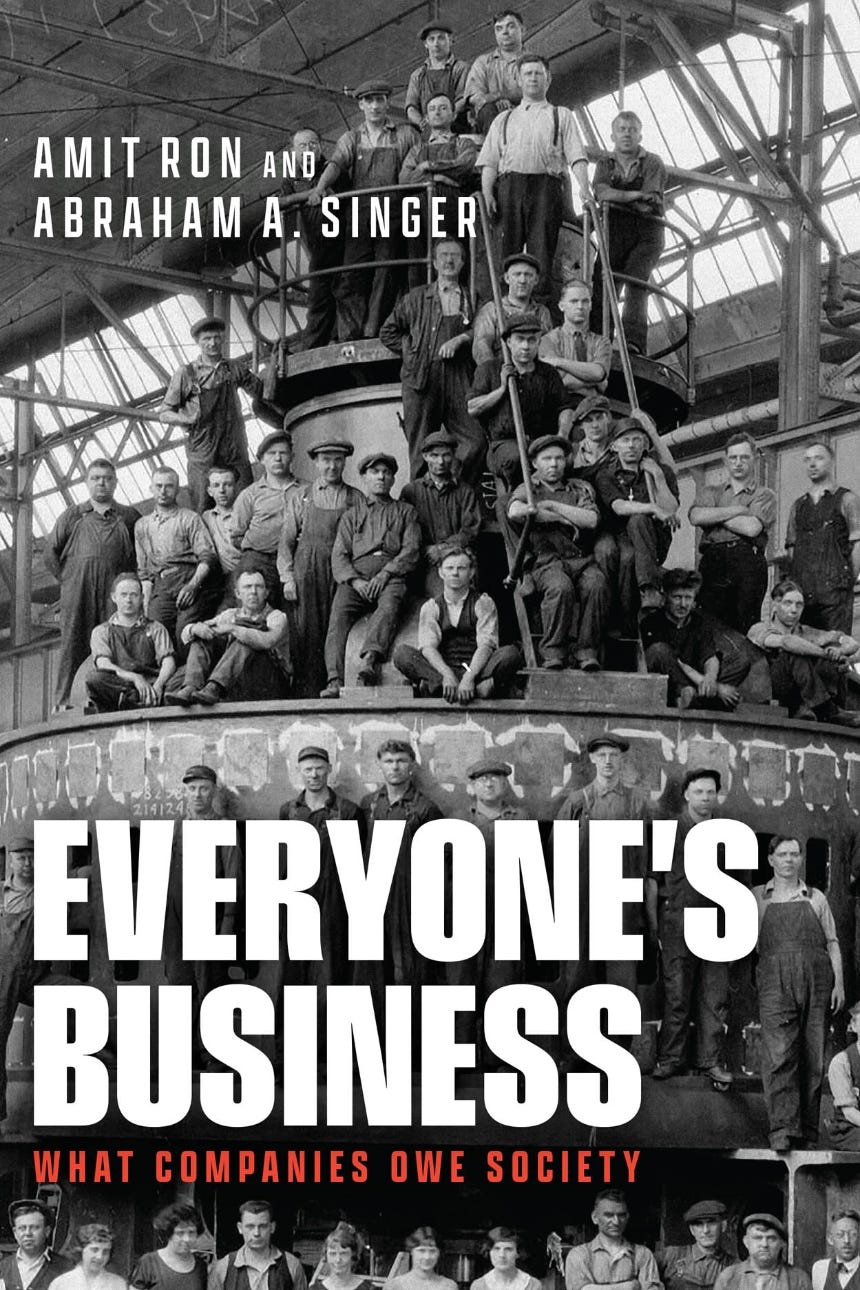Marta Rocchi: ‘Everyone’s Business: What Companies Owe Society’ by Amit Ron and Abraham A. Singer
Everyone’s Business presents a well-structured but complex analysis of the responsibilities that businesses have towards the democratic societies in which they exist.
Approaching a new book on the recurrent and vastly researched question on the responsibilities of business towards society, readers might wonder where the novelty might be. In Everyone’s Business: What Companies Owe Society, Ron and Singer take a specific perspective to solve the old (and still relevant) question and apply a novel lens to provide answers: readers will not be disappointed. The authors, from their point of view as ‘political theorists’ (page 18) and openly (and critically) from ‘the left side of the political spectrum’ (page 11), explore the political dimension of business activity, with a specific focus on the concept and practice of power. Ultimately, the authors work to develop the idea that business has a responsibility towards democracy, which translates into an obligation to respect those processes which confer on business the position it has.
Overall, the book makes for good reading, and is well structured, written and presented. There is clearly a conceptual density, to the point that each chapter can be commented on in itself regarding the content and the selection of the literature that the authors offer. For this reason, this review presents a brief synthesis of the first chapters, where the authors present their theory, then it provides a glance at the remaining chapters with a more specific focus on one of them (Chapter 5), to give an idea of how the authors put their approach into action.
The Introduction offers a concise, ordered, and logical synthesis of the main lines of argument of the book. It presents an exhaustive preview of the book. It introduces the research question and the starting point of the authors’ research: ‘we take the problem of corporate power, and the threat that power poses to democracy, as the starting point for thinking about business ethics and corporate social responsibility. What obligations do businesses have given their place within societies aspiring to democratic systems of governance?’ (page 3). The Introduction also provides a preview of an essential construct for an understanding of the book: the authors see business activity as a ‘social subcontract’ (page 5). They present commerce as an organized ‘sphere of social activity’ (page 6), that society itself establishes, conferring on it a degree of autonomy with the purpose of contributing to social ends.
Chapter 1 provides an enjoyable anthology of approaches to business ethics, and a re-reading of them as theories of power. Profit-maximization, stakeholder theory, social contract theories, and also political corporate social responsibility and market failure approaches are presented in terms of corporate power. There is also a final table (page 47), which gives visual evidence of the structure followed by the authors in building their perspective throughout Chapter 1. The other chapters would have probably not allowed for a similar synthesis, but it is highly beneficial at the end of a dense chapter to be gifted a structured table to appreciate the content at a glance. All these theories, according to the authors, leave unaddressed important questions regarding different dimensions of corporate power. Ultimately, the authors want to show that a functioning democratic society is able to host a functioning business and make it work for social ends, and that the dynamic of power between business and society sheds light on how this can happen. Chapter 1 concludes with a good synthesis of what one of the main contributions of the book is: ‘If business ethics is fundamentally about constraining the power that businesses possess, and democracy is an essential background process for determining what aspects of that power need to be constrained and how, then businesses’ ability to affect and undermine democratic processes is a crucial topic for business ethics to consider, which the theories on offer, despite their many strengths, don’t quite address’ (page 48).
Therefore, and this leads to Chapter 2, the authors start building their own contribution, making their way to outlining the obligations that businesses have towards democracy. They take more space in this chapter to define the idea of business as ‘social subcontract’ (pages 50-51), which entails the existence of obligations attached to the social position of businesses but also attached ‘to the political processes that determine their social position’ (page 51). The authors define those as second-order obligations. They then provide a definition of democracy and finally outline principles for democratic business ethics.
After a chapter dedicated to the rule of law and related ethical obligations (Chapter 3), the authors show how to apply their principles for democratic business ethics to contexts where democracy is potentially undermined. Therefore, they present lobbying (Chapter 4), as a form of undermining formal democratic procedures; marketing (Chapter 5) and activism (Chapter 6), as ways of undermining informal democratic procedures; and they conclude with forms of undermining democratic relations (Chapter 7 and 8), taking into account relationships in the workplace and between businesses and communities.
As the content of each chapter is very dense, readers can navigate the chapters according to their interests. Here, a quick preview of the chapter on marketing (Chapter 5) is offered. Marketing is integral to current market practices, and it has a very wide and diverse reach. The authors here are worried about how marketing influences the processes and structure of a deliberative democracy, where the accent is on the engagement of citizens in the formulation of ideas, positions, reasons and in good debate. Marketing is in a position to influence deliberation, and also to influence what citizens think about politics, for example. From this perspective, the omnipresence of advertising in citizens’ everyday lives comes under the spotlight in the second half of the chapter: the authors present compelling cases regarding ad placement, the creation of stereotypes, product placement and the erosion of trust (pages 120-125). They conclude with four short cases regarding product placement: these examples show, in different degrees, that businesses, by penetrating the public sphere with advertisements designed not to be perceived as such, have the power to undermine the essential trust ‘needed for a reasoned exchange of ideas in the public sphere’ (page 124).
Looking at possible criticisms regarding this book, the authors state that they aim to ‘introduce the uninitiated’ (page 18). While commendable, the level of the book is clearly higher than a completely uninitiated reader could digest. This does not mean that the book is not clear. On the contrary, the authors do a tremendous job in summarizing complex theories and selecting the elements they need to advance their thesis, in an ordered and logical way. Nevertheless, approaching the book in possession of some degree of familiarity with the existing theories on the relationship between business and society would clearly help with navigating the work’s complexity.
To close the loop, of course there is always something more and something else to theorize in a crowded and well-researched field. Ron and Singer, well aware of the ‘sheer volume of discussion about what businesses owe to society’ (page 2) show an extremely good mastery of the complexity of this interdisciplinary exploration and deliver a novel output of praiseworthy specialized academic quality.
‘Everyone’s Business: What Companies Owe Society’ by Amit Ron and Abraham A. Singer was published in 2024 by The University of Chicago Press (ISBN: 978-0-226-81938-9). 234pp.
Marta Rocchi is Associate Professor of Business Ethics at DCU Business School, Dublin City University, Ireland. For more information, visit her webpage here.




